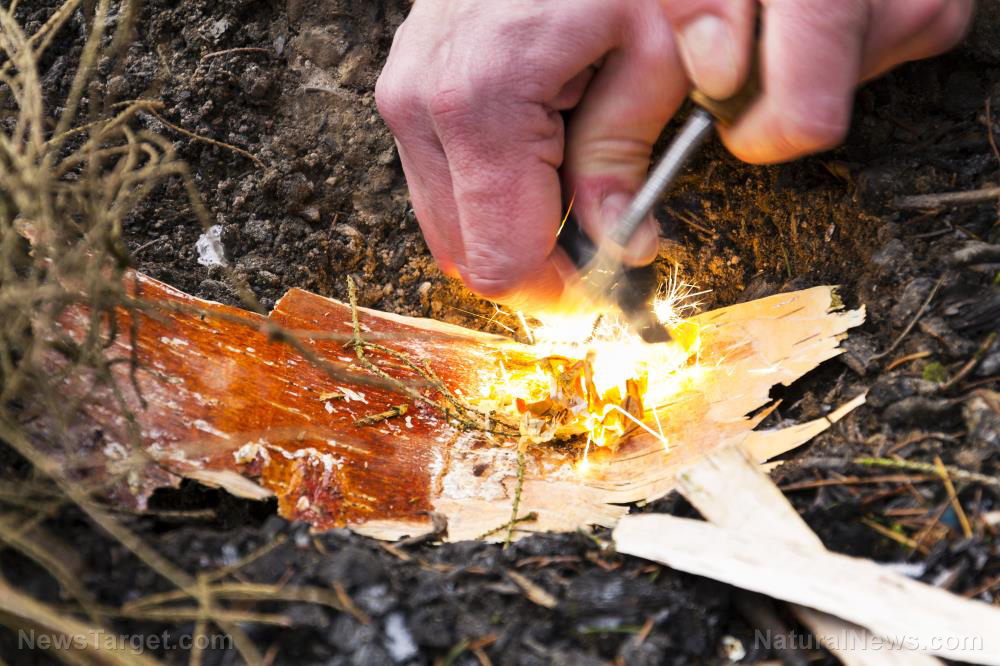Self-sufficiency and self-discipline: Be practical and use your survival preps daily
05/12/2019 / By Zoey Sky

Civilians are bound to forget their survival instincts due to modern conveniences, but preppers know that survival habits can also be applied to various aspects of your life. From your kitchen to your home garden, your prepping and survival skills can hone your readiness and even help you save some money. (h/t to Survivopedia.com)
Survival isn’t just about surviving disasters. Just because things seem quiet, it doesn’t mean you have to stop being a prepper.
Life involves different kinds of dangers. Even if these aren’t on the same level as natural disasters, you still need to be on your guard to avoid accidents like a car crash caused by a drunk driver or the threat of unemployment.
Don’t wait until SHTF before you live in “prepper mode.” The more you use your skills, the easier they will come to you when disaster strikes.
Rotate the food in your survival stockpile.
The basics of prepping involve building a stockpile, so start rotating your food and emergency supplies. To avoid food spoilage, track the purchase and expiration dates on your food items.
Rotating your food stocks ensures that you don’t keep cans of food that are past their expiration dates in your pantry. Once you start rotating your supplies, use up the oldest one in your stockpile. Since you’re replacing the items that you use, you’re also constantly restocking your inventory.
Planning ahead ensures that you won’t have a shortage and that you can rotate items in your stockpile.
Grow your own food.
Cultivating a survival garden gives you access to fresh, non-GMO produce right in your own backyard. Producing fresh fruits and vegetables takes some hard work, but it is very practical.
Consider this: The average cost of food is $550 a month for a 2.5 person family (the average family size these days). You can use this money to invest in gardening and raising animals for food, which will help you save money on your monthly grocery budget.
Don’t wait until SHTF to start growing your own food. Start now and learn how to cultivate crops that can thrive in your area.
Below are some of the best foods to grow in a home garden.
- Beans – One of the healthiest vegetables you can eat, beans are full of nutrients like vitamins A, C, and K. Beans also contain calcium, fiber, and other vitamins and minerals.
- Broccoli – Broccoli is rich in proteins, and it contains vitamins A and K.
- Carrots – You can grow carrots in cooler months and they’re full of vitamin A, an essential nutrient for survival.
- Lettuce – Lettuce contains vitamins A, B6, C, and K. It can grow really quickly, and it grows in large quantities.
- Onion – Onions are also easy to grow. They’re a long-lasting crop, and when stored properly, they can be consumed at a later date.
- Potatoes – Potatoes belong to a handful of crops that can grow in any climate. Potatoes are great survival food and they are full of nutrients and calories.
- Tomatoes – Tomatoes offer various health benefits, such as lowering your risk for cancer and heart disease. This vegetable is simple to grow, and they preserve very well.
Heating your home.
Heating your home is another crucial aspect of prepping. The average family spends more than $200 per month on just heating costs. If you can put a wood-burning stove and a fireplace into your home, use them to keep your family warm instead and save on heating costs.
Gather free fuel from trees that are down in your neighborhood. You can also look for dead limbs that were cut off or broken tree limbs that were removed after a storm. With a bit of heavy lifting, you can have as much free firewood as you need. Just make sure to rotate firewood because letting them season too long can cause a termite problem.
Use back-up off-grid power.
Your family also requires electric power for various daily tasks. If you have some solar panels or a wind turbine, you can produce electricity.
Even if the electricity is not enough to power your whole house, putting those solar panels to use now will help you save on energy costs. (Related: Develop these daily habits that help you prepare for emergencies.)
Don’t connect the output of the voltage inverter to your home’s electrical grid. This way, you’re only using the electricity you’re generating for specific purposes, such as charging power tool batteries or pumping a garden well. It also guarantees that your batteries don’t get drained into the grid if the power goes out.
As a disciplined prepper, you should know that the key to maintaining your stockpile of supplies is rotating them. This prevents spoilage, and it also helps you get used to eating a lot of the same foods on a regular basis.
Incorporate prepping and survival into your daily life so you’re always ready for small- and large-scale emergencies.
Sources include:
Tagged Under: bug in, bug out, Collapse, disaster, emergencies, home gardening, homesteading, multipurpose survival tools, off grid, preparedness, preparedness and survival, prepper, prepping, prepping habits, prepping tips, self sufficiency, self-reliance, self-sustainability, SHTF, survival, survival food, survival garden, survival skills, survival supplies



















